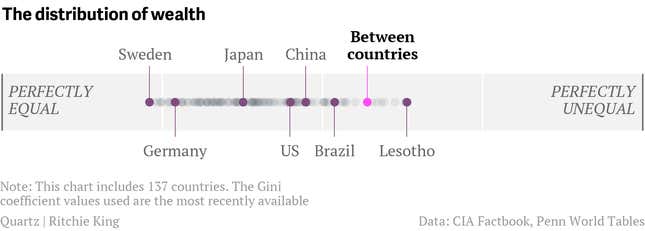This week, Quartz reported that developing economies now contribute more to global GDP than developed ones. A reader responded with a question: Does this mean that wealth is now spread more evenly across the world’s nations than it is within countries like the US (which have high levels of income inequality)?
It’s a straightforward question without a straightforward answer. We’ve attempted to solve it using the Gini index, and the result is no: The distribution of wealth between countries is still much less equitable than it is inside of most of them.

The Gini index is the most commonly used measure of income inequality. It’s a number between 0 and 100, where 0 means that everybody earns the same amount (“perfectly equal” in the chart above) and 100 means that a single person makes everything. The Gini index for the US was 45 in 2007, and for Sweden, it was 23 in 2005, according to the CIA’s World Factbook.
How did we calculate such a value for the distribution of wealth between the countries of the world? Think of each country as an individual person with an income. We set that income equal to the average income for the country — or technically, the gross national product per capita, adjusted by purchasing power so all of the countries can be compared on equal footing. Then we used those values to calculate the Gini index. The answer was 57 for 2010.
There are surely other ways to approach this—if you have any thoughts, please leave an annotation or two in the margin.